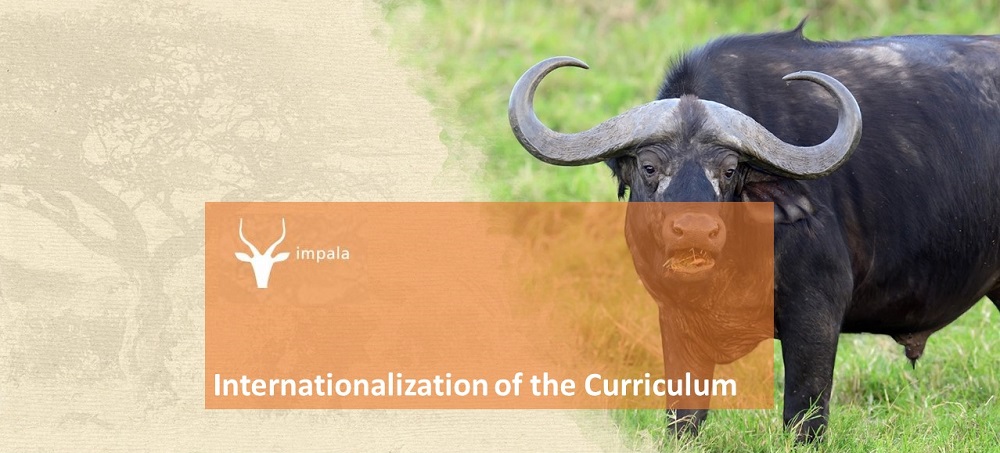What makes the MADM a success story are the characteristic features of its internationalized curriculum: its curriculum content and structure, the composition of the classroom, and its pedagogy. These features are carefully designed to balance local, national, international and global aspects of development research and development practice and are aligned with the programme’s internationalization approach and goals.
What makes the MA in Development Management an internationalization success story?
The Master of Arts in Development Management (MADM) is an 18-month, interdisciplinary, English-taught Master programme offered by the Institute for Development Research and Development Policy at the Ruhr-University Bochum and the University of the Western Cape as part of the South African German Centre for Development Research. It was launched in 2000 and has now produced nearly 300 successful graduates from 72 countries all around the world. These graduates now act as change makers in international development cooperation and international development research both in their home countries and abroad.
The characteristic features of its internationalized curriculum are: its curriculum content and structure, the composition of the classroom, and its pedagogy. These features are carefully designed to balance local, national, international and global aspects of development research and development practice and are systematically and coherently aligned with the programme’s specific internationalization approach and goals, including the intended international learning outcomes.
Transformative and inclusive internationalization approach
Internationality and diversity in general and cultural diversity more specifically are seen as resources. The MADM is committed to a comprehensive, transformative and inclusive internationalization approach. It has been designed to cater for the needs of future professional experts in international development cooperation and to inspire researchers in the field of international development studies, providing them with subject-specific, inter/disciplinary and international and intercultural knowledge, tools and skills to deal successfully with the challenges of:
• designing, implementing and evaluating development programmes and projects in an international and interdisciplinary development team, together with the community and local, regional and international stakeholders.
• conducting, assessing and critically reflecting on interdisciplinary research in the field of development studies in an international and interdisciplinary research team and to communicate findings effectively to local and international audiences.
Fine-tuned internationalized curriculum structure and content
The content and structure of the MADM curriculum , including its institutionalized mobility windows and extracurricular activities, are such that learning activities in all courses and at all levels of the programme are designed to develop students’ subject-specific knowledge and skills and global perspectives and cross-cultural capabilities .
A comparative, reflective, interdisciplinary and research-oriented yet practical approach is evident in the content and structure of the programme. This ensures that every student is exposed to the challenges of knowledge creation, application and evaluation in development research and practice in different parts of the world. Fostering critical reflection on how knowledge is created, evaluated and applied in development practice in response to different development challenges enables students to “theorize [their] own reality” and “strike the right balance between the local and the global” , an approach recently called for by Mahmood Mamdani.
The MADM starts with an overview of local, national, international and global development challenges and a multidisciplinary and multiparadigmatic introduction to the international development cooperation system and the understandings, theories and strategies of development and underdevelopment.
During their internship period in Germany or abroad and the two International Summer Schools in Bochum and Cape Town, the students gain insights into the practices of national and international development organizations and of research in international development studies. An intercultural communication and team-building seminar is also offered.
The second semester is dedicated to the challenges and success factors of applying and assessing the tools and methods for planning, implementing and evaluating development programmes and projects.
In the third semester, students concentrate on writing a thesis based on a research project started at the beginning of the programme. The thesis should deal with a research problem relevant to development in their home country. It is designed to demonstrate students’ ability to reflect on research critically, to embed their research in local and global debates and to communicate effectively.
Throughout the research process, students work in small international and interdisciplinary research teams of three students and are supervised by academic mentors.
A Comprehensively Diverse International Classroom
An international, intercultural, interdisciplinary, socioeconomically diverse and gender-balanced student body is seen as key to an enriching international learning experience. Student recruitment and selection are carefully designed for every intake.
The MADM faculty is internationally and interdisciplinarily composed and engages in international development research. International guest lecturers are invited from the MADM’s global network of partner institutions and alumni.
Pro-active alumni engagement and support is part of the MADM’s internationalization success: alumni are involved as guest lecturers, in international student recruitment and as advisors on the internationalization of the curriculum and quality assurance.
This international and diverse community brings together students, lecturers and alumni from different cultural, disciplinary and socioeconomic backgrounds to inspire and learn from each other in and outside the classroom. It allows students to share and reflect on a wide variety of views and experiences from different parts of the world.
Innovative and Inclusive Teaching, Learning and Assessment
To ensure the successful participation and interaction of all students in class and to enable them to reflect critically on their own personal experiences, the MADM employs a variety of innovative and inclusive teaching, learning and assessment methods (including e-learning), tailored to the different learning styles, disciplinary backgrounds and academic needs of the diverse student body.
These methods complement the other measures taken to internationalize the curriculum: international and interdisciplinary teamwork, comparative case studies (including from the students’ home countries), role plays, service-learning, different forms of international and interdisciplinary peer learning and co-teaching. The same applies to assessment and feedback methods and to the teaching and learning materials used, which are drawn from a broad range of international reference bases.


